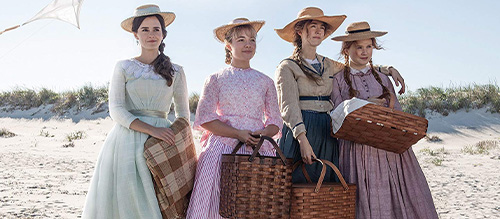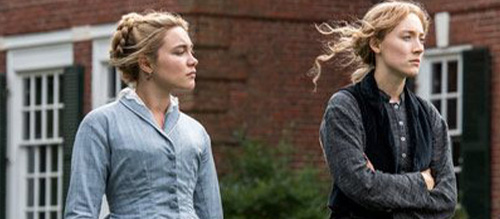Little Women (2019) Review
Little Women (2019)
Director: Greta Gerwig
Screenwriter: Greta Gerwig (based on the novel by Lousia May Alcott)
Starring: Saoirse Ronan, Emma Watson, Florence Pugh, Eliza Scanlen, Laura Dern, Timothee Chalamet, James Norton, Louis Garrel, Meryl Streep, Tracy Letts
2019 has marked an all time high in global cynicism, which to myself has felt like an overwhelming blanket of numbness that turns everything grey. Once sumptuous treats are now ashes in my mouth, and while visiting the cinema was once a beloved past-time, it now feels like a chore and more tragically even a waste of my precious time. I’m alarmed to find myself in some kind of survival mode, adopting the defence mechanism of delving into the films of my childhood to emulate the cliche of “simpler times”. Largely, I’m genuinely disinterested in most other film outings, but this transforms into anger at the constant stream of sequels, remakes and reboots. To cut a long story short, I did not have very high expectations for Greta Gerwig’s adaptation of “Little Women”, but it was oh so wonderful to have my grumpy preconceptions pleasantly shattered. Little Women will be the Greta Gerwig movie that will establish her as one of the most important filmmakers of the 21st century.
Counting the first feature film adaptation all the way back in 1918, this 2019 release marks the 5th time that Lousia May Alcott’s work has been adapted for the big screen (it may be more accurate to say it’s the 6th adaptation but I’m not struck on the idea of counting the 2017 modern-day Hallmark flick). With the feature films of the 30s, 40s and 90s boasting numerous Academy Award wins and nominations, as well as ensemble casts of Hollywood’s greatest talents at the time, Greta Gerwig certainly had very big shoes to fill. Nevertheless, she instantly made the story her own by giving the all too familiar narrative a shake-up to freshen the story for both new eyes and die-hard Alcott enthusiasts.
Surprisingly, the film begins in the middle of the book “Good Wives” rather than the titular “Little Women”, following the daily life of the iconic heroine Jo March (Saoirse Ronan) in New York where she precariously balances a day job with her true passion for writing (stares directly in the camera in the style of ‘The Office’). The opening act also reveals the rest of the March sisters in their current position in life: Meg (Emma Watson), as the devoted mother and wife who still yearns for the finer things in life; Amy (Florence Pugh) the apparent spoilt baby of the family on her art course in Paris, who actually takes her responsibilities to her family and her position in society seriously; and finally Beth (Eliza Scanlen) who takes comfort in her music as she is left behind by her sisters who have grown up. It is when Jo receives an urgent telegram from her family asking her to come home that Jo’s mind begins to wander through her past, contemplating how she ended up where she is in life and who she has become as a person.
Through this delightfully original approach, the film draws you in and submerges you entirely into the re-telling, much in the same way Jo is sucked into her own memories. Furthermore, the immediate establishment of the four sisters as distinct characters within their own singular lives produces one of the best representations of family in cinema: individuals with their own unique dreams and ambitions (along with some serious faults and shortcomings) united by shared values, morals and passions. The March girls all share the agony of growing pains and fury against the continued injustice of the world around them, particularly against the injustice the girls themselves face regarding their own desires and ambitions because of their gender.
The method of flashback storytelling lends itself wonderfully to the task of characterising the individual March sisters. The instant comparison between the sisters as children and as young women shows their growth but also the core elements of their personality, creating believable chemistry. The squabbling, bickering, but also any sisterly solidarity is natural and relatable, leading to a huge amount of comedy, which came as a genuine surprise. Saoirse Ronan and Florence Pugh shine in their roles as Jo and Amy respectively, while Gerwig’s contemporary approach directs the stars in a more honest depiction of sisterhood, with an actual warts and all reflection of the sibling rivalry between Jo and Amy, which comes pretty close to tearing them apart. More than ever before, the heart aches with empathy towards the love and hurt that comes between Jo and Amy.
This modern approach is both the greatest weakness and strength of the 2019 adaptation. The greatest apprehension I held before seeing the film was shoe-horned feminism. Sexuality equality in the film industry is an ongoing battle that must be addressed, but when women-centric or women-led projects are basically obligated to “make a statement”, it can often come across as shallow and even tiresome, which can both detract from the cause and even harm it. Indeed, some moments of 21st century “wokeness” have produced some honestly puke-worthy and overly saccharine moments, usually involving Laura Dern’s Marmee. Admittedly, Alcott’s perfect Marmee is a difficult character to establish without being preachy or annoying, and luckily Gerwig’s script often saves the day before scenes get too sugary, but Marmee’s confession of “I’m always angry” behind her sweet, benevolent face absolutely floored me. That single line encapsulated my state of being for the last 5 years and yet also offered me help in this personal predicament. Instead of dismissing Marmee as laughable and irrelevant, I was instead shown the power of optimism and kindness within the darkest of times. Bravo to Gerwig – some of your scenes rotted my teeth out, but by God you had the substance to validate your sentimentality.
“Little Women” itself is one of the great pieces of feminist literature so it does seem unfair to criticise a politically correct approach within a contemporary adaptation. Indeed, interpretation of the novel through modern feminist philosophy revealed the most unexpected takes that totally subverted the most cliched tropes of female characterisation, effectively spitting in the eye of sexist constructs.
Gold digging has always been associated with female characters whom have a loose grip on morality or are just plain villainous. However, in Civil War Era America in which women had no means to support themselves independently, the will to forsake love and therefore personal happiness to marry into wealth so as to support your family is presented as nothing short of courageous if not entirely selfless.
This does however contrast Jo’s personal journey, in which the picture’s intentions become inconsistent and the message of the film is unclear. For fans of the story, Jo March is seen as the iconic headstrong independent woman, and in 2019 there is a huge amount of pressure for characters to live up to the ultimate feminist expectations. You can feel that Gerwig herself was torn between producing the fantasy that would satisfy Fourth Wave Feminists and staying true to the touching romance of Alcott’s beloved novels; and this confusion of the author is glaringly obvious during the more slower-paced sections of the movie which may accidentally ground some potential audiences out of the film. Gerwig does, however, use this inner conflict to bring home the overarching message of her adaptation – Jo yearns for both independence and for a loving relationship because she is human; as she is human she has value, dignity and the right for her voice to be heard; and as her humanity is inextricably linked to her womanhood, it is the proof that the voices and stories of women deserve to be heard and are undoubtedly important.
For a story that I thought I knew as well as the back of my hand, it was truly a wonderful surprise to find that I could take home new pieces of wisdom from Little Women (2019). Gerwig’s adaptation proves that Louisa May Alcott’s work is still relevant to modern readers and audiences. In some ways, this continued relevance is disheartening as women today are still faced with the same barriers women encountered in the 1860s, but this joyous and love-filled adaptation revels in the undying spirit of femininity and even hands out tangible defences for the constant battle for equality through its introspective approach. For myself, this is not my definitive version, but it very well could become so for the 12 year old sat beside me in the cinema, and at the end of the day that’s what actually matters. Through the work of Gerwig, a new generation of March girls is guaranteed.
19/24



